- Home
- Paula McLain
When the Stars Go Dark: A Novel Page 2
When the Stars Go Dark: A Novel Read online
Page 2
“What can I say, Anna? What can anyone say about something so awful?”
His voice was usually gruff, not soft like this. I wished I could freeze him where he stood, him and everyone else in a child’s game of statue, and walk away. Instead I only nodded. “Thanks.”
“You should take as much bereavement time as you need for yourself. Don’t worry about a thing, okay?”
The wall seemed to inch nearer as he spoke. “Actually I was thinking I’d come back next week. I need something else to focus on.”
“C’mon, Anna. You don’t mean that. It’s too soon. You should only be thinking about your family right now, and taking care of yourself.”
“You don’t understand, Frank.” I could hear my voice tightening around the words and tried to slow down, to sound less desperate. “I’ll go crazy here with nothing to do. Please.”
He raised his eyebrows and seemed just about to correct me as my husband walked up. Frank stood a little straighter and reached out his hand. “Brendan. Tough day. I’m so sorry, man. Let me know if there’s any way I can help.”
“Thanks, Frank.” Brendan’s gray knit tie hung loosely at the open collar of his shirt, but nothing in his body seemed remotely relaxed as he stood between Frank and me, glancing back and forth as if he was attempting to read a feeling in the air. “So what’s going on here?”
“Nothing,” I lied quickly. “We can talk about it later.”
“I heard you.” He blinked rapidly, his face growing pink. “You can’t seriously mean to go back to work right now.”
“Listen,” Frank said, stepping forward. “I just said the same thing. I’m on your side.”
“Who’s on my side?” Behind me the wall felt smooth and cool against my palm, and yet I felt caged suddenly. Trapped. “I’m just trying to get through this, okay? If I can’t distract myself—” I couldn’t finish the sentence.
“I can’t believe you!” Brendan clamped his lips together, his nostrils flaring. “How about us? How about focusing on your family? Don’t we deserve that from you? Especially after what happened?”
It was as if he’d slapped me. I froze in my body. “That’s not what I mean.” I could hear how stiff my answer sounded, how defensive.
“Yes, it is.”
Frank and I both watched him turn on his heel, then push his way through the room full of bodies with his head down.
“You should go after him. He’s just grieving. People say all kinds of things when they’re in pain.”
“People, Frank? What about my pain?” Inside my chest, everything felt airless, sealed in a vacuum. “You blame me too, don’t you? Just say it.”
(three)
The air temperature feels like bathwater as I leave Santa Rosa, and the sun glitters obscenely. Even the unkempt motel parking lot is a garden, half a dozen silk trees with feathery fuchsia drag-queen blooms. There are birds everywhere—in the branches, in the smudgeless sky, in the broken neon Jack in the Box drive-through kiosk, where three fuzzy chicks stare at me from a nest threaded with drinking-straw wrappers, their throats so pink and open it hurts to look at them.
I order a large coffee and an egg sandwich I can’t eat before cutting over to Route 116, which will thread me through the Russian River Valley to the coast. Jenner is the town there, a postcard more than an actual village. Far below, Goat Rock looks like a giant’s crude toy ball against the dizzying blue of the Pacific, the sort of magic trick Northern California seems to do in its sleep.
In thirty-five years, I’ve never left the state or lived anywhere south of Oakland, and yet the beauty still guts me. Stupid, effortless, ridiculous beauty that goes on and on and on—the roller coaster of the Pacific Coast Highway, the sea like a slap of wild color.
I pull over and park on a hard little oval of dirt just off the side of the highway, crossing both lanes to stand on a bald place above snarled brush and black saw-toothed rocks and bursts of spiky foam. The plunge is dramatic. Dizzying. The wind comes at me, clawing under every layer of clothing so that I have to hug myself, shaking. Then my face is wet, suddenly, tears coming for the first time in weeks. Not about what I’ve done or not done. Not about what I’ve lost and can never get back, but because there’s only one place I can go from here, I realize, one road on the map that means anything to me now. The way back home.
For seventeen years, I’ve stayed away from Mendocino, locking up the place inside myself like something too precious to even look at. Right now, though, on the edge of this cliff, it feels like the only thing keeping me alive, the only thing that’s ever been mine.
If you think about it, most of us have very little choice about what we’re going to become or who we’re going to love, or what place on earth chooses us, becoming home.
All we can do is go when we’re called, and pray we’ll still be taken in.
* * *
—
By the time I reach Albion a few hours later, coastal fog has blotted out the sun. It swirls ahead of my low beams, making everything vanish and reappear, the twisting coast road and clustered fir trees, and then the village, finally, like something out of a dark fable—Victorian houses floating white and anchorless over the headlands, the mist all around shuddering and releasing, seeming to breathe.
I feel a clamping sensation as each winding turn brings me closer to the past. The shapes of the trees seem to echo. The road signs too, and the long damp bridge. I’m almost on top of the stoplight by the time I register it and have to gun my way through, racing the yellow onto Little Lake Road. Then I’m out on the bluff, going on pure muscle memory.
Turning left on Lansing Street, I feel as if I’ve squeezed sideways through time. Above the roofline of the Masonic Hall and against a gauzy sky, the figures of Time and the Maiden stand sharp and white, the most iconic thing in the village. A bearded, elderly figure with wings and a scythe, braiding the hair of a girl standing before him. Her head bowed over a book resting on a broken column, an acacia branch in one of her hands, an urn in the other, and an hourglass near her feet—each object an enigmatic symbol in a larger puzzle. The whole carving like a mystery in plain sight.
Once, when I was ten, soon after I came to live in Mendocino, I asked Hap what the statue was supposed to mean. He smiled and told me the history instead. How a young millworker and carpenter named Erick Albertson had carved it from a single piece of redwood in the mid-1800s, working at night in his cottage on the beach. During that time he’d become the first master of Mendocino’s Masonic Order, but never stopped laboring on his masterpiece. It took him seven years in all and then, sometime after the carving was erected in 1866, he had died in a strange accident the history books couldn’t properly explain.
Hap had been a member of the Masonic Order for decades, longer even than he’d been a forest ranger. I assumed he knew everything, all there was to know. But when I asked him how Albertson’s passing was connected to the figures and what they meant, he gave me a sideways look.
“Albertson’s death doesn’t have anything to do with you. And anyway, it happened so long ago. The symbols wouldn’t make sense even if I explained them. They tell a story known only to Masons, never written down, only passed on by mouth as they take their Third Degree.”
I was even more intrigued. “What’s the Third Degree?”
“What you’re giving me now,” he said, and walked away before I even got the joke.
* * *
—
I park and pull on a baseball cap and sunglasses before stepping out into the chilly, fog-wet street. It’s hard to imagine any locals recognizing me as a grown woman, but the San Francisco papers are widely read up here, and occasionally my cases had landed me in the Chronicle. So had the accident, for that matter.
In Mendosa’s Market, I keep my gaze down, trying to grab only essentials, canned vegetables and dry goods, things easy to prepa
re. But part of me feels caught up in the spinning reel of an old movie. I was just here, it seems, right here by the lit icebox full of milk while Hap reached out for a cold gallon and opened it, drinking from the jug and winking at me before passing it my way. Then he was pushing the cart again, steering with his elbows, leaning over the basket. Idling as if we had all the time in the world.
But no one has that.
When I finish my shopping, I pay in cash, loading the bags into the back of my Bronco before heading down the street to the GoodLife Cafe. It was called something else when I lived here, but I can’t remember what, and it doesn’t matter. The sound and shape and smell of the place fit my memory exactly. I order coffee and a bowl of soup, and then sit in the window facing the street, comforted by the noises around me, dishes clattering in the bus tub, fresh beans in the grinder, friendly talk. Then, from over my shoulder, I hear two men arguing.
“You don’t really believe all that bullshit, do you?” one barks at the other. “Psychics and whatnot? You know how much money that family has. She just wants a piece of it. Hell, I don’t blame her.”
“What if she really does know something, and no one follows up on it?” the other man spits back. “The girl could be bleeding out somewhere or worse.”
“She’s probably already dead.”
“What’s wrong with you? She’s a person. A kid.”
“A famous person’s kid.”
“That doesn’t mean anything. What if the psychic is telling the truth? Haven’t you ever seen or heard something you can’t explain?”
“Nope. Can’t say that I have.”
“Then you’re not paying attention.”
* * *
—
Listening to them gives me a weightless, unmoored feeling. I pay for my coffee and soup, careful not to look their way, and cross to the message board on the far wall. It was always part of our morning ritual, Hap’s and mine. He had a way of leaning back instead of forward as he scanned the board, a solid white mug in his hand, his eyes roving for something that hadn’t jumped out just yet.
“How much do you think you can know about a town this size?” he asked me once, early on.
I’d lived in larger, dingier towns all through Mendocino County. By comparison, the village was spick-and-span, with only fifteen streets that even had names. In my mind, it seemed like a doll’s house you could open like a suitcase and see into, room by room. “Everything.”
“People you see every day? Houses you pass a thousand times without thinking?”
“I guess so.”
“Think, Anna. What makes a blind spot?”
He meant like when we were driving. “Someone being right on your shoulder, too close to see.”
“That works for people, too. Anyone under your nose just disappears. That’s the danger zone, right next to you. Whoever it is you trust the most.”
I was listening to him, listening hard. For as long as I could remember, people had been telling me that I should trust them, social workers and teachers and total strangers, all of them saying a version of the same thing, that I should let my guard down and open up. But the world had been showing me the opposite, and now Hap was, too. “What’s the secret then?”
“There’s no secret, just keep your eyes open. Open all the time, but especially when you think you can’t be surprised. That’s when you learn to pay attention, to listen to your own voice.”
“What about other people?”
“They’ll either earn your trust or they won’t.”
He meant himself and his wife, Eden, too. Some other type of ten-year-old girl with a different set of experiences might have felt nervous hearing this, but I was relieved. He didn’t trust me yet, and I didn’t trust him. Finally someone wasn’t trying to pretend any of this was easy. Finally someone had decided to tell the truth.
* * *
—
The café’s name may have changed, but the message board hasn’t. I comb through the postings slowly, bright snatches of colored paper hawking guitar lessons and palm readings and garden soil. Someone is looking for an artist’s model. Someone else wants free firewood. I take my time reading the messages one by one until I come to the missing girl, her lost lovely face under the words Have you seen me?
Cameron Curtis
Age: 15
Last seen: 9/21
Red flannel shirt, black jeans
5'4" 105 lbs
Long black hair, dark brown eyes
Tips: 724-555-9641
Substantial reward offered
September 21 was yesterday, the day Brendan had finally had enough and asked me to go. The timing makes me feel shaky as I look at the girl again, her dark serious gaze, the spill of hair to her waist, all of her too beautiful to be safe anywhere for long. Something in the curve of her mouth tells me that very wrong things have happened to her, even before she disappeared. I’ve seen too many like her to believe otherwise. But this isn’t San Francisco, where missing teen flyers are plastered on every Muni kiosk, a sight so familiar they become transparent. In a small place like Mendocino, I know all too well, any act of violence is personal. Everyone will be feeling this. Everyone will be affected.
I stare at the girl for one moment more and then reach for the number of a cottage for rent, just beneath her missing poster. The place is seven miles out of town and four hundred dollars a month. When I call the owner, Kirk, he explains that there’s no TV service, phone line, or central heat.
“It’s what you’d call bare bones,” he says. “A nice getaway, though, if you like things quiet.”
“I do.”
(four)
The first time I saw Mendocino, it hardly seemed like a real place. The tidy streets were lined with gingerbread houses, most of them white with lavish trim and picket fences. The whole village stretched out on the shaggy, rounded bluff against the Pacific, small enough to take in all at once, with one grocery store, a handful of cute shops, two cemeteries, and an elementary school.
“What are those?” I asked Hap, pointing at a wooden square-sided turret attached to a neighboring house. Mrs. Stephens, my social worker, had just left and we were standing in Hap and Eden’s front yard on Covelo Street.
“Tank houses,” Eden explained. “Water towers.” Her body was soft and round and smelled of powder, while Hap was tall and tautly built, with wide shoulders and a handlebar mustache. If he looked like a cowboy, she looked like a grandmother, but wasn’t one, I’d just learned. They’d fostered a lot, but never had children of their own.
Their house was beautiful, a large Victorian that looked to me like a ship. The second story was set wider than the first, with rounded front windows aimed at the headlands, a wild expanse of gold grass and wind-twisted cypresses. As we stood together, just getting the feel of one another and this new arrangement, the sun was setting in their front yard.
I’d just come from Fort Bragg, from a small, sad box of a house near the army base. From there, you could see the ocean too, but not like this. Nothing I’d ever seen was like this. The sun slid into the Pacific as if it was slowly melting, a ball of widening orange-pink taffy that seemed to pulse from the center, like a beating heart. I couldn’t take my eyes off of it.
Then, just as the sun vanished completely, there was a sudden green flash.
“That’s good luck,” Eden said.
I’d stopped believing in luck, but something was happening. Mendocino had already begun to pull on me, like gravity.
* * *
—
Following directions from Kirk, I head out of the village on Little Lake Road. Five miles later, the road turns from asphalt to packed dirt and gravel. Firs and pines and Sitka spruce thicken around me, pushing in from all directions, black-tipped fairy-tale trees that knit shadows out of nothing, night out of day—as if they’v
e stolen all the light and hidden it somewhere. God, but I’ve missed them.
After another two miles, I take a sharp left marked with a red flag and a battered wooden sign: NO ACCESS. The earthen lane shrinks as it winds down a steep hill for three-tenths of a mile. Then I see the driveway and the silhouette of the cedar cottage winking through a stand of dense, towering pines. It looks like somewhere a hermit might live, like an island in the trees, a cave to disappear in. It’s perfect.
* * *
—
Kirk stands waiting for me on the porch. He appears to be in his midsixties, with stiff shoulders and short-bristled gray hair in a military cut. His face is angular and his eyes flinty looking even as he smiles and gives me a small wave, keys in hand. “Trouble finding the place?”
“Not too bad.” I notice the porch is neat, with cordwood stacked nearly to the window ledge on one side. “Was this a trapping cabin?”
“Once, I guess. Belonged to my wife’s family. Now I rent it when I can.” I feel him studying me, wondering about my story. “Most folks want a whole lot more, a romantic getaway. That sort of thing.”
I only nod and stamp in after him. The main room is murky, full of dark paneling and smelling of mice, a slightly sweet and rotten odor, almost feral. A round-bellied woodstove sits angled in one corner, blackened from use. Rose-colored chintz curtains frame the windows in the tiny kitchen, where there’s a dollhouse-sized sink and washboard counter, and a refrigerator better suited for a dorm room. A single threadbare dish towel hangs from a metal hook.
“You can see you have everything you need here,” Kirk said.

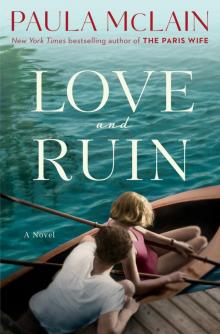 Love and Ruin
Love and Ruin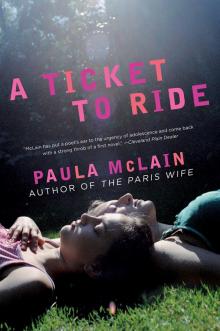 A Ticket to Ride
A Ticket to Ride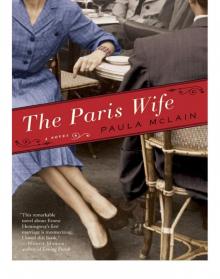 The Paris Wife
The Paris Wife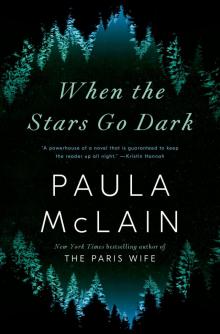 When the Stars Go Dark: A Novel
When the Stars Go Dark: A Novel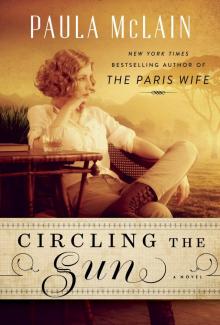 Circling the Sun
Circling the Sun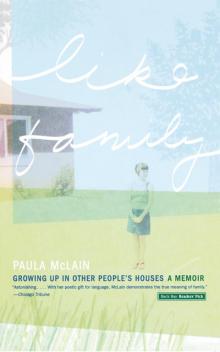 Like Family
Like Family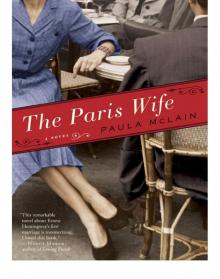 The Paris Wife: A Novel
The Paris Wife: A Novel